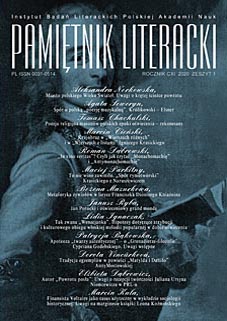W oczach „późnej potomności”. Wiersze Franciszka Dionizego Kniaźnina.
In the Eyes of “Late Descendants”. Franciszek Dionizy Kniaźnin’s Poems
Review: Rolf Fieguth, „Sobie wielki”. O pięciu zbiorach lirycznych Franciszka Dionizego Kniaźnina. Warszawa 2018
Author(s): Tomasz ChachulskiSubject(s): Studies of Literature
Published by: Instytut Badań Literackich Polskiej Akademii Nauk
Keywords: Franciszek Dionizy Kniaźnin; Rolf Fieguth; Jan Kochanowski; Anacreon; Latin poetry; lyrical cycle; collection of poems; Enlightenment; 18th c. poetry; sentimentalism; rococo; ancient tradition
Summary/Abstract: Rolf Fieguth’s book about Franciszek Dionizy Kniaźnin’s poetry is the first so extensive monograph from the time of Teresa Kostnkiewiczowa’s study publication “Kniaźnin jako poeta liryczny” (“Kniaźnin as a Lyric Poet,” 1971), and it is viewed as an attempt at a comprehensive reading of his poetry. Fieguth analyses the collections of Kniaźnin’s poems in a chronological order: “Erotyki” (“Erotic Poems,” 1779), “Carmina” (1781), “Wiersze” (“Poems,” 1783), “Poezyje” (“Poetry,” 1787) and pieces from Rękopis Puławski (Manuscript of Puławy, 1794–1796). The researcher points at numerous connections between the individual pieces, examines the modes of grouping them into lyrical cycles, discusses the functions of lyrical subject, intertextual relations, references to ancient literature, and, first and foremost, to Jan Kochanowski (especially his “Treny” <”Laments>” and “Muza” <”The Muse>” both of which Kniaźnin translated into the Latin language). Fieguth’s most crucial achievement is viewing Kniaźnin’s Polish and Latin output as a whole independent of language (Polish and Latin) and having common features, but also intermingling in many ways. Fieguth appreciates both the Latin volume of Kniaźnin as well as “Poem”s from the year 1783 that include the first editing of “Żale Orfeusza nad Eurydyką” (“Laments of Orpheus for Eurydice)”, the cycle that from that moment became most vital part of composing subsequent editions of Kniaźnin’s poetry until the last one written down at the twilight of the poet’s conscious life. Important observations are also included in reference to the two last collections, namely “Poezyje” (“Poetry)” and poems from the Manuscript of Puławy.
Journal: Pamiętnik Literacki. Czasopismo kwartalne poświęcone historii i krytyce literatury polskiej
- Issue Year: 111/2020
- Issue No: 1
- Page Range: 229-240
- Page Count: 12
- Language: Polish

